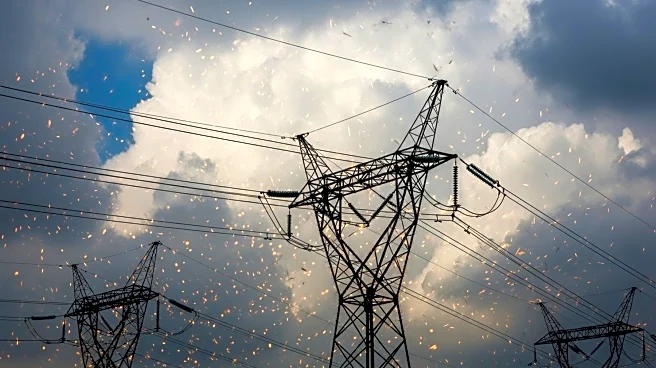What's Happening?
Russia has launched a series of attacks on Ukraine's power grid, aiming to disrupt energy infrastructure before the onset of winter. Ukrainian President Volodymyr Zelenskyy reported that Russia has intensified its aerial strikes, deploying over 3,100 drones, 92 missiles, and approximately 1,360 glide bombs in the past week. The attacks have resulted in significant damage to energy facilities in regions such as Donetsk, Odesa, and Chernihiv, and have wounded employees of Ukraine's largest private energy company, DTEK. The strikes have also caused blackouts and damaged residential buildings, marking one of the largest concentrated assaults on Ukraine's energy infrastructure. Concurrently, Russia has expressed 'extreme concern' over the potential provision of U.S. Tomahawk cruise missiles to Ukraine, a topic discussed between Zelenskyy and President Trump.
Why It's Important?
The ongoing attacks on Ukraine's power grid are part of Russia's strategy to weaken Ukrainian morale and resilience during the harsh winter months. The destruction of energy infrastructure poses a significant threat to Ukraine's ability to maintain essential services and support its population. Additionally, the potential provision of U.S. long-range weapons, such as Tomahawk missiles, could alter the dynamics of the conflict, providing Ukraine with enhanced capabilities to counter Russian aggression. This development has raised tensions, with Russia expressing concern over the escalation of military support from the U.S. The situation underscores the geopolitical complexities and the potential for further international involvement in the conflict.
What's Next?
Ukraine is in discussions with U.S. officials regarding the acquisition of long-range precision strike weapons, including Tomahawks and ATACMS tactical ballistic missiles. A senior Ukrainian delegation is expected to visit the U.S. to further these talks. President Trump has indicated a decision is forthcoming on the provision of Tomahawks, which could significantly impact the conflict's trajectory. Meanwhile, Russia and its allies, such as Belarus, are closely monitoring these developments, with Belarusian President Alexander Lukashenko expressing skepticism about the immediate deployment of such weapons. The international community remains watchful of the evolving situation and its implications for regional stability.
Beyond the Headlines
The attacks on Ukraine's energy infrastructure highlight the broader ethical and humanitarian concerns associated with targeting civilian facilities during conflict. The deliberate disruption of essential services raises questions about the conduct of warfare and the protection of non-combatants. Additionally, the potential introduction of advanced U.S. weaponry into the conflict could lead to a shift in military strategies and alliances, influencing long-term geopolitical relations. The situation also underscores the importance of international diplomatic efforts to address the root causes of the conflict and seek sustainable solutions.









